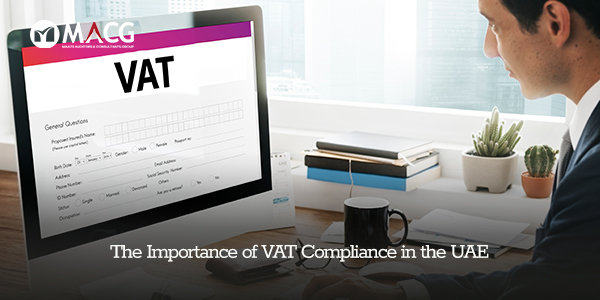For businesses operating in the United Arab Emirates (UAE), Value Added Tax (VAT) compliance is not just a legal obligation—it is a critical component of financial management. Proper VAT bookkeeping ensures adherence to Federal Tax Authority (FTA) regulations, minimizes risks, and optimizes tax efficiency.
At Maats Auditors and Consultants, we understand the complexities of VAT compliance and the challenges businesses face in maintaining accurate records. This guide provides a structured approach to VAT bookkeeping, tax management, and compliance, helping businesses avoid penalties and streamline their financial operations.
VAT in the UAE: Key Requirements
Introduced on January 1, 2018, VAT in the UAE is imposed at a standard rate of 5% on most goods and services. Businesses meeting certain thresholds must comply with registration, invoicing, and reporting requirements.
1. VAT Registration
- Mandatory Registration: Businesses with taxable supplies and imports exceeding AED 375,000 annually must register.
- Voluntary Registration: Businesses with taxable supplies or expenses above AED 187,500 can opt for voluntary registration.
2. Record-Keeping Obligations
The Federal Tax Authority (FTA) requires businesses in the UAE to maintain comprehensive financial records for a minimum of five years. These records must include sales and purchase invoices, credit and debit notes, import and export documentation, as well as detailed accounting records that reflect income, expenses, and VAT liabilities. Maintaining accurate and complete documentation is essential for ensuring compliance and facilitating smooth audits or tax reviews.
3. Filing VAT Returns
VAT returns are typically filed quarterly, with deadlines falling on the 28th day following the end of the tax period. Late submissions can result in penalties.
4. VAT-Compliant Invoicing
To comply with VAT regulations in the UAE, invoices must include specific details such as the supplier’s Tax Registration Number (TRN), customer details (if the customer is VAT-registered), a clear breakdown of VAT-exclusive and VAT-inclusive amounts, and an accurate description of the goods or services provided. Including this information ensures the invoice meets Federal Tax Authority (FTA) standards and supports proper tax reporting.
5. Special VAT Considerations
- Designated Zones: Certain free zones are treated as outside the UAE for VAT purposes, affecting tax applicability.
- Reverse Charge Mechanism: Applies to imported goods/services, shifting VAT responsibility to the recipient.
Why Proper VAT Bookkeeping Matters
1. Ensures Legal Compliance
Accurate bookkeeping prevents non-compliance penalties, including fines for late filings or incorrect submissions.
2. Enhances Financial Transparency
A well-maintained VAT system provides clarity on tax liabilities and refund opportunities, aiding financial planning.
3. Simplifies VAT Return Filing
Organized records reduce errors and streamline the VAT return process, saving time and effort.
4. Minimizes Audit Risks
Proper documentation ensures businesses are audit-ready, reducing the risk of disputes with the FTA.
Steps for Effective VAT Bookkeeping
Implementing a reliable bookkeeping system is essential for effective VAT management. Businesses can opt for manual bookkeeping, which may be suitable for smaller operations, or adopt accounting software such as QuickBooks, Xero, or Zoho Books to automate VAT calculations and invoicing. Cloud-based solutions are particularly advantageous, offering real-time updates, enhanced scalability, and improved compliance with evolving tax regulations in the UAE.
1. Track VAT on Sales and Purchases
- Output VAT (Sales): Record VAT charged on taxable supplies.
- Input VAT (Purchases): Document VAT paid on business expenses to claim refunds.
2. Categorize VAT Rates Correctly
- 5% Standard Rate: Applies to most goods and services.
- 0% Rate: For exports and certain essential goods.
- Exempt Supplies: Includes financial services and residential property leases.
Misclassification can lead to incorrect VAT filings and potential penalties.
4. Prepare and Submit VAT Returns Accurately
- Calculate net VAT payable (Output VAT – Input VAT).
- File returns via the FTA portal before the deadline.
5. Maintain Audit-Ready Records
- Store invoices, receipts, and tax returns securely.
- Conduct periodic internal reviews to detect discrepancies early.
- Correct errors proactively to avoid penalties.
Common VAT Bookkeeping Mistakes to Avoid
- Incorrect VAT rates applied to transactions.
- Missing or incomplete records, leading to compliance issues.
- Claiming non-deductible VAT, such as entertainment expenses.
- Late filings, attracting FTA penalties.
Navigating VAT compliance requires expertise and precision. At Maats Auditors and Consultants, we offer:
- VAT Registration & Advisory Services
- Accurate Bookkeeping & Tax Filing
- VAT Audit Support & Dispute Resolution
- Software Implementation for VAT Automation
Our team ensures your business remains compliant while optimizing tax efficiency.
Final Thoughts
VAT compliance is a strategic necessity for UAE businesses. By implementing structured bookkeeping practices, companies can avoid penalties, improve financial transparency, and focus on growth.
For expert guidance on VAT bookkeeping, tax compliance, and audit support, partner with Maats Auditors and Consultants. Let us handle the complexities while you concentrate on achieving your business goals.
Contact us today for a consultation!


